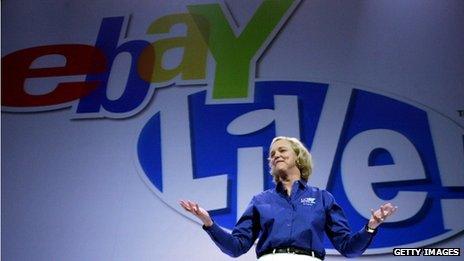HP’s boss and a disastrous deal
- Published
- comments
Rory Cellan-Jones interviews Meg Whitman
She's the woman who built eBay from a scrappy start-up to a global force. Now Meg Whitman is trying to pull off a rather different trick - stopping a computer industry titan from slipping away into irrelevance.
But when she visited London, the focus was bound to be on one of the worst decisions HP has ever made - its acquisition of the British technology firm Autonomy in 2011.
Last November HP took an $8.8bn (£5bn) write-down on the value of Autonomy, a business for which it had paid roughly $11bn. At the same time the firm and its CEO launched an extraordinary attack on the Cambridge-based software firm's former management team, accusing them of misrepresenting the value of the business and of accounting irregularities.
Mike Lynch, the firm's founder, rejected the charges and accused HP in turn of destroying his software business through its own ineptitude. The whole affair is now in the hands of the regulators and the courts. So was it wise to pick such a public fight last November?
"It was necessary," Meg Whitman told me this morning. She repeated HP's claims to a US court, saying "there had been very serious strategic misrepresentations, accounting improprieties and when we understood what had happened we had to explain to our investors".
Obviously the huge write-down had to be explained somehow to investors. But the suspicion among some has been that the charges of impropriety were a convenient smokescreen to cover a simple truth - that HP had paid far too much in its desperation to land the deal.

Whitman in her eBay days
Even on the day the deal was announced, I wrote that one extremely sceptical analyst told the CEO Leo Apotheker he was paying "a fantastic price".
Meg Whitman was not in charge at the time but was on the board - and in our interview she came pretty close to admitting that HP had overpaid with or without any accounting shenanigans. She insisted a "big chunk" of the write-down had been due to what emerged about the company after the purchase. But what about the rest of it?
One person close to the former management of Autonomy said even HP's allegations about questionable accounting only added up to $100m in misclassified sales: "It's impossible to get from a revenue misclassification of $100m dollars a year to a writedown of $5bn."
Last week, one HP figure did pay the price for the disastrous deal. Chairman Raymond Lane resigned, and that gives the CEO some breathing space.
Meg Whitman has always said it will be a long job turning around HP, but she told me she'd made a lot of progress. She'd won the "hearts and minds" of HP's 300,000 strong workforce to her strategy, the company had "the best product line we've had in a decade", while innovation was "alive and well".
If so, that message has yet to be communicated to the outside world. It's hard to think of any standout products that would get customers thinking of HP as a great innovator. The CEO admitted customers hadn't said that for a while but promised that in the next six months that would change, with its new line of Moonshot servers and its enterprise security software: "In six months, I bet people will say 'wow, I didn't know HP had all this'."
The most obvious change she's made since taking over is to squash the idea that HP should spin off its core PC business, which has been badly left behind in the move to mobile computing.
She recognised the need to compete in a world which has been transformed by always-on touchscreen devices of all shapes and sizes. So was there going to be a mobile phone?
"We want to. What we haven't figured out yet is how to do that without it just being a me-too product and losing a lot of money, which I'm not interested in doing."
Given its recent history, you can see why HP's boss might be cautious about spraying money around to little effect. But if she's to make the business a technology leader again, rather than managing its decline, Meg Whitman needs to come up with a standout product pretty soon.